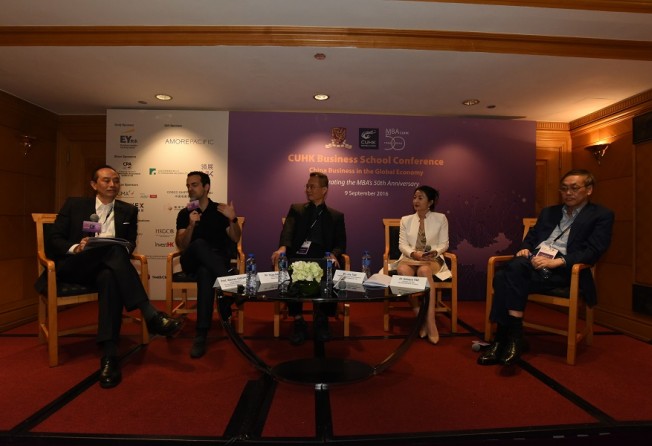
Live Report: Panel Session - "Tech Innovation in China"

[Sponsored article]
The "Tech Innovation in China" panel members, include moderator Professor Waiman Cheung, Executive Director The Asia-Pacific Institute of Business, The Chinese University of Hong Kong, Dr. Edward Tse, Founder & CEO Gao Feng Advisory Company, Hie-Ping Chan, Executive Cloud Development, IBM Greater China Group, Hugo Barra, Vice President, Xiaomi Global and Joy Tan, President of Corporate Communications Huawei Technologies Co. The audience laugh as Professor Cheung removes his tie and says a relaxed attire is in keeping with the technology topic.
Responding to moderator Cheung’s scene-setting comments relating to the latest technology trends in China and how China can differentiate itself in tech innovation on the global stage, the panel discussion opens up with Chan showing a 100-page report outlining the Chinese Government’s encouragement to be creative. "Innovation with the government support has taken off," says Chan. He says it used to be said that China was not a place where creativity was active. However, this is rapidly changing. "I travel the world, but I have yet to see payment systems that are anywhere as good as they are in China," explains Chan. "The government realise this is a good way to encourage people to spend more and put more money through the finance systems," says Chan. "China also has strong manufacturing to support innovation and IoT," Chan continues.
Tan outlines the activities Huawei is involved in and highlights the company’s rising involvement in the smartphone space. "There are two main drivers for innovation which are customer needs and technology development," says Tan. She elaborates by saying Huawei invests in R&D and global talent alongside collaboration. The company also partners with leading universities around the world including the CUHK. "We look at five to ten years ahead, innovation is a marathon not a sprint," she advises. She then explains how R&D includes product solutions for customers but also new technologies and materials. "Innovation is not just about technology, it is also includes management to drive R&D and technology," says Tan.
Tse says tech innovation is a great topic, but what is innovation, he asks. "It is different than invention, innovation can be a step change that’s new, but not necessary new, but creating multiple layers of value," says Tse, "In China technology is moving very fast, but this includes business modeling fueled by the use of technology," notes Tse. He adds China is moving into a new era where people understand innovation and the way knowledge can drive innovation. "There are many companies that are in the game of innovation and they are so different than the idea of what innovation represented a few years ago," says Tse. The reason he says, is partly driven by the solutions to challenges that have been created over the last 50 years. "There are a lot of pain-points that have been exposed which opens up opportunities," says Tse.
Professor Cheung says the panel discussion is so relevant that next year it should be broadcast live to CUHK MBA students. Cheung asks if Shenzhen deserves the title as the most technology innovative city in China. Barra takes the mic and tells the audience how he came from Silicon Valley where he worked for Google and says in comparison tech development in Shenzhen works at a high speed. "I found that tech development in China works at twice and maybe three times Google speed," says Barra. He adds that China has put into place the infrastructure to support tech development. "I predict China will be the first nation in the world to implement drone delivery at a large scale."

Tan makes the point that e-commerce in China has moved quickly. Also, the introduction of 4G and most likely 5G by 2020 which will allow users to download content at 10 G per second. "I think we can say China is working pretty well from a technology perspective, but innovation needs to be a global mentality," says Tan. For example, she says with a 100 billion things connected via the internet predicted in a few years, China cannot stand alone.
Tse says while technology in the private sector is moving ahead, a major challenge for China is how to improve the productivity and processes in traditional industries. "Maybe technology can play a role in helping to change their business model structures," speculates Tse.
The panel also offer their expert insights on Beijing's aim to lead the world in innovation by 2050 with a government blueprint launched as part of the drive to shift economic gears from quantity to quality. For example, panel members note while China’s support for the growing e-commerce sector has largely redrawn the economic landscape, there are many burgeoning sectors racing ahead to define the innovation curve of China. For instance, smart home technologies, mobile payments, wearable tech, service robots, location-based games and the like will continue to grow what is arguably the largest startup market in the world. Commenting on these developments, Chan says the technology sector could move even quicker if there was a more open culture of co-operation and sharing. "From my experience in the US in Silicon Valley and China, there is a bigger culture of sharing ideas," says Chan.
To support Chinese tech an audience member asks if the education system in China is robust enough. "I think if a more global approach is taken, starting with young children, China will move ahead even faster," says Barra. Tan adds with the world becoming ever more dependent on technology, it is vital that children learn science and engineering skills at an early age. "There is a big shortfall in the number of IT people we need," concludes Tan.
